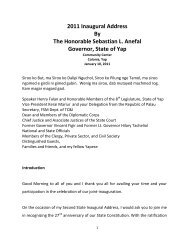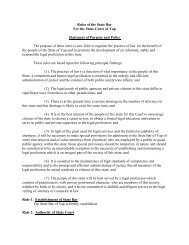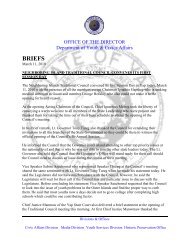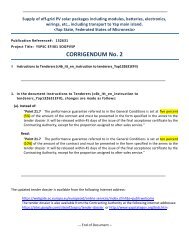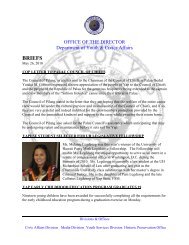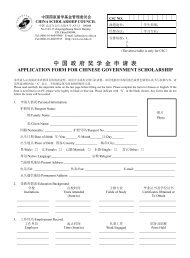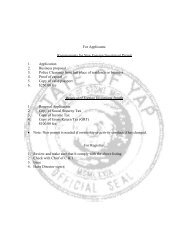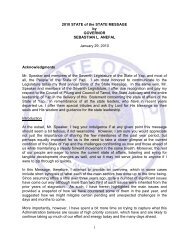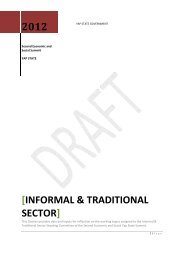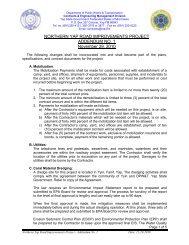RULES OF CIVIL PROCEDURE For the Trial Division of the Yap ...
RULES OF CIVIL PROCEDURE For the Trial Division of the Yap ...
RULES OF CIVIL PROCEDURE For the Trial Division of the Yap ...
Create successful ePaper yourself
Turn your PDF publications into a flip-book with our unique Google optimized e-Paper software.
Rule 67. Deposit in Court. In an action in which any part <strong>of</strong> <strong>the</strong> relief sought is a<br />
judgment for a sum <strong>of</strong> money or <strong>the</strong> disposition <strong>of</strong> a sum <strong>of</strong> money or <strong>the</strong> disposition <strong>of</strong><br />
any o<strong>the</strong>r thing capable <strong>of</strong> delivery, a party, upon notice to every o<strong>the</strong>r party, and by<br />
leave <strong>of</strong> court, may deposit with <strong>the</strong> court all or any part <strong>of</strong> such sum or thing.<br />
Money paid into court under this rule shall be promptly deposited by <strong>the</strong> clerk in a<br />
bank licensed to do business in <strong>the</strong> State <strong>of</strong> <strong>Yap</strong> in <strong>the</strong> name and to <strong>the</strong> credit <strong>of</strong> <strong>the</strong> court.<br />
No money deposited shall be withdrawn except by order <strong>of</strong> <strong>the</strong> court.<br />
Comment: The sources <strong>of</strong> this rule are U.S. Federal rule 67 and Title 28, Sections<br />
2041 and 2042 <strong>of</strong> <strong>the</strong> United States Code.<br />
Rule 68. Offer <strong>of</strong> Judgment. At any time more than 10 days before <strong>the</strong> trial begins, a<br />
party defending against a claim may serve upon <strong>the</strong> adverse party an <strong>of</strong>fer to allow<br />
judgment to be taken against him for <strong>the</strong> money or property or to <strong>the</strong> effect specified in<br />
his <strong>of</strong>fer, with costs <strong>the</strong>n accrued. If within 10 days after <strong>the</strong> service <strong>of</strong> <strong>the</strong> <strong>of</strong>fer <strong>the</strong><br />
adverse party serves written notice that <strong>the</strong> <strong>of</strong>fer is accepted, ei<strong>the</strong>r party may <strong>the</strong>n file<br />
<strong>the</strong> <strong>of</strong>fer and notice <strong>of</strong> acceptance toge<strong>the</strong>r with pro<strong>of</strong> <strong>of</strong> service <strong>the</strong>re<strong>of</strong> and <strong>the</strong>reupon<br />
<strong>the</strong> clerk shall enter judgment. An <strong>of</strong>fer not accepted shall be deemed withdrawn and<br />
evidence <strong>the</strong>re<strong>of</strong> is not admissible except in a proceeding to determine cost. If <strong>the</strong><br />
judgment finally obtained by <strong>the</strong> <strong>of</strong>feree is not more favorable than <strong>the</strong> <strong>of</strong>fer, <strong>the</strong> <strong>of</strong>feree<br />
must pay <strong>the</strong> costs incurred after <strong>the</strong> making <strong>of</strong> <strong>the</strong> <strong>of</strong>fer. The fact that an <strong>of</strong>fer is made<br />
but not accepted does not preclude a subsequent <strong>of</strong>fer. When <strong>the</strong> liability <strong>of</strong> one party to<br />
ano<strong>the</strong>r has been determined by finding or order or judgment, but <strong>the</strong> amount or extent <strong>of</strong><br />
<strong>the</strong> liability remains to be determined by fur<strong>the</strong>r proceedings, <strong>the</strong> party adjudged liable<br />
may make an <strong>of</strong>fer <strong>of</strong> judgment, which shall have <strong>the</strong> same effect as an <strong>of</strong>fer made before<br />
trial if it is served within a reasonable time not less than 10 days prior to <strong>the</strong><br />
commencement <strong>of</strong> hearings to determine <strong>the</strong> amount or extent <strong>of</strong> liability.<br />
Rule 69. Execution.<br />
(a) In General. Process to enforce a judgment for <strong>the</strong>. payment <strong>of</strong> money shall be a<br />
writ <strong>of</strong> execution, unless <strong>the</strong> court directs o<strong>the</strong>rwise. The procedure on execution, in<br />
proceedings supplementary to and in aid <strong>of</strong> a judgment, and in proceedings on and in aid<br />
<strong>of</strong> execution shall be in accordance with <strong>the</strong>se rules except that any law <strong>of</strong> <strong>the</strong> State <strong>of</strong><br />
<strong>Yap</strong> governs to <strong>the</strong> extent it is applicable. In aid <strong>of</strong> <strong>the</strong> judgment or execution, <strong>the</strong><br />
judgment creditor or his successor in interest when that interest appears <strong>of</strong> record, may<br />
obtain discovery from any person, including <strong>the</strong> judgment debtor, in <strong>the</strong> manner provided<br />
in <strong>the</strong>se rules.<br />
(b) Vacant. (Against Certain Public Officers)<br />
Rule 70. Judgment for Specific Acts; Vesting Title. If a judgment directs a party to<br />
execute a conveyance <strong>of</strong> land or to deliver deeds or o<strong>the</strong>r documents or to perform any<br />
o<strong>the</strong>r specific act and <strong>the</strong> party fails to comply within <strong>the</strong> time specified, <strong>the</strong> court may<br />
direct <strong>the</strong> act to be done at <strong>the</strong> cost <strong>of</strong> <strong>the</strong> disobedient party by some o<strong>the</strong>r person



